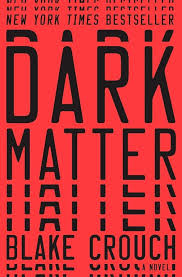Science fiction at its best helps us care about ideas and care about people. Blake Crouch’s Dark Matter hits both targets dead center. It’s the best I’ve read this year among many top-rated novels in the genre.
Too often SciFi is plot driven, like an action movie. It’s fun, to be sure. And Dark Matter has plenty of action and drama. But that’s not what sets this book apart.
 So what’s the central idea the book deals with? What would it be like to live a different version of your life, to follow a different key choice you made that would lead you down a different path? Yes, that’s not entirely new, but its an important idea, one that the book makes you think about.
So what’s the central idea the book deals with? What would it be like to live a different version of your life, to follow a different key choice you made that would lead you down a different path? Yes, that’s not entirely new, but its an important idea, one that the book makes you think about.
Likewise, Blake Crouch focuses on people–the other missing dimension from so many SciFi books. His central character, Jason Dessen living in present-day Chicago, is three dimensional, complex and conflicted. He and others are not cardboard cut outs used as excuses for a wild ride through the universe. They are people we can identify with, imagine ourselves with, imagine wanting to help.
What’s Jason’s dilemma? Think of those who are closest and dearest to you, and now imagine they are suddenly gone–either by your own choices or because of others. How do you feel and what do you do to get them back? Would you compromise your own values and ethics to do so? Would you let them go for a greater good? The gravity of Crouch’s book draws us into all these questions.
In short, Dark Matter is deeply human, taking seriously both heart and mind.
